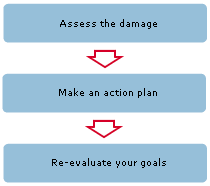It may be too late to talk about avoiding burnout.
Perhaps you have reached a stage where you are disillusioned with your
job and are now just going through the motions. Where do you go from
here?
Change Careers
If you have lost all
interest in the values that led you into your profession in the first
place, then a career change may be the only option. However, you may
well lose the benefit of the precious experience that you have gained
within the profession, and you may be competing equally with younger
people who are willing to accept lower salaries. You may also feel a
strong sense of failure, whereas burnout will have been only a temporary
setback if you can turn the situation around.
Change Jobs
A job change is
appropriate if you are disillusioned with your organization rather than
your career. You will bring with you many of your skills and much of
your experience, and you can rededicate yourself to your original goals
in a new environment. Make sure that you understand the causes of your
burnout and that history does not repeat itself. Be aware of the
stresses of a new job.
Think Smart
People can survive stress for quite a long time and
then suddenly collapse. To avoid this happening to you, take steps to
protect yourself from burnout. Doing nothing is not an option.
Talk to people about how
you feel, take a holiday before you’re completely exhausted, and think
about how you can improve your life by removing some of the more
stressful elements and achieving a better balance.
Turn Burnout into Personal Growth
The most positive way to manage burnout is to treat
it as a wake-up call, an opportunity to re-evaluate the way you want to
live your life and what you want to achieve.
Why did it happen?
– Deal with the sense of failure by taking a hard, dispassionate look
at the circumstances leading up to it. Talk the situation through with
someone you trust, looking at your workload, your actions, and those of
others, and how the situation evolved. No doubt you made some mistakes,
but a good deal of the blame probably lies with the situation, your
colleagues, or those who set up the situation.
Determine your goals
– Re-evaluate your goals and think about what you want to achieve with
your life, giving due weight to relaxation, the quality of life issues,
and the social activities that will help to protect you against burnout
in the future. Make sure that your goals do not conflict, and that they
are not so challenging that they become a source of excessive stress in
their own right.
Make a new start
– Assess your current position with respect to these goals using SWOT
analysis, and identify where you need to develop new skills or solicit
the help of other people. Make an action plan and start to work on it.
This may include changing job or career, but you will be doing this as
part of an active plan for the future, not as an escape.
Burnout often results in
people taking a long hard look at what they are doing with their lives.
They re-evaluate their priorities and focus on living a life that is
worthwhile to them.
